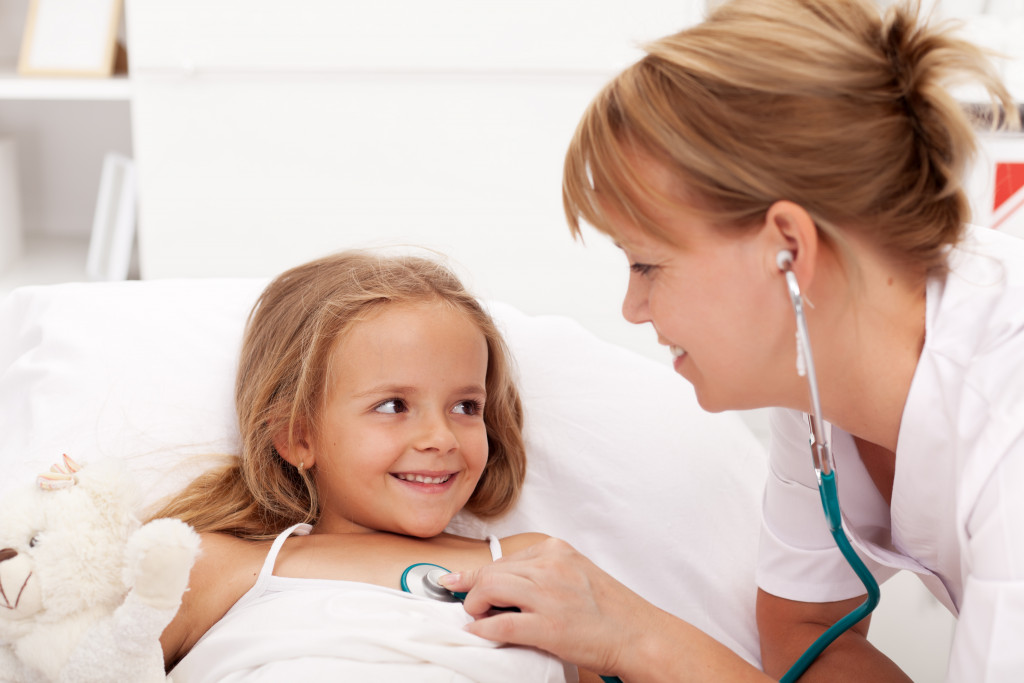Households with children have more complex concerns regarding Covid-19. If any of the parents fall sick, childcare will suffer. Even more concerning is the possibility of Covid-19 infecting the children. As of April 2021, the American Academy of Pediatrics (AAP) stated that children made up more than 20 percent of all newly reported cases of Covid-19.
The good news is that Covid-19 vaccination is now allowed for children who are 12 years old and older. Dr. James D. Campbell of the AAP Committee on Infectious Diseases urges parents to have their children vaccinated. He adds that there are ongoing clinical trials for the vaccine for children six months old and above.
In the meantime, parents with unvaccinated children must be extra careful. Children aged two years old and above must wear masks when they are around people not from their household. Parents must ensure that they keep six feet or more away from other people and sanitize their hands regularly.
Health Concerns Beyond Covid-19
According to a study published on May 10 at Academic Pediatrics, primary care hospital visits among commercially insured children nationwide decreased from March 25 to October 6, 2020. The researchers attribute this to a hesitation among parents and pediatricians to expose children to clinics in the pandemic.
Another possible reason raised by the study is that fewer illnesses among children during that period were because of public health measures addressing Covid-19. Children were less exposed to others because they stayed home instead of being in school or childcare services.
The study expressed concern, though, that this may have compromised the preventive medical needs of children. By the middle of April 2020, total vaccinations ordered for pediatric Medicaid beneficiaries were 3 million fewer than the previous year. The largest decrease was among children older than two years old.
By mid-October onwards, there was a rebound in pediatric visits, including routine vaccine administration. There remains a deficit, though, in the vaccinations that were not administered in previous months.
The Centers for Disease Control and Prevention (CDC) emphasizes that parents must not miss the scheduled vaccinations of their children apart from the Covid-19 vaccination. These routine vaccines are usually given at birth, at one month, at two months, at four months, and six months. There is a gap, and then another bout is given at 12 months, at 15 months, at 18 months, and 19 to 23 months.
Some boosters are necessary between four to six years old. These vaccines protect against chickenpox, diphtheria, Hib that causes meningitis, hepatitis A, hepatitis B, influenza, measles, mumps, pertussis, polio, pneumococcus, rotavirus, rubella, and tetanus.
At six years old and onwards, the child must get yearly flu vaccines. At 11 to 12 years old, all children must get a shot against tetanus, diphtheria, and pertussis (Tdap), a shot of meningococcal conjugate (MenACWY), and two shots of the human papillomavirus (HPV) vaccine. For children with weak immune systems, pediatricians will recommend a third shot. Pediatricians also recommend a booster shot of MenACWY at 16 years old.
It is the responsibility of parents to ensure that children get all their vaccinations. A single record must be kept from birth, with every vaccination recorded even if given by different doctors or clinics.
Bring Your Child to the Doctor

Some childhood illnesses can be treated at home. The AAP states that you can do so if the symptoms are mild, familiar, and common, and the child remains alert and active. A fever means a temperature of 100.4 degrees Fahrenheit and higher. However, even with only 100 degrees, a child who is irritable and lethargic needs a doctor’s examination.
Younger children are more vulnerable to illness. Call the doctor immediately if an infant younger than three months old has a fever or if a baby from three months to two years old has a fever for more than a day. Other symptoms that need a doctor’s care are flu, colds, cough, sore throat, and any pain.
Emergency treatment is necessary when the child has difficulty breathing, decreased alertness, skin or lips turning blue or purple, seizure, or becomes unconscious. Uncontrolled bleeding, poisoning, and severe burns also require emergency attention.
Home Care During Sickness
After a child is diagnosed and prescribed the proper medication, care can be continued at home. Make sure the child is comfortable, and the temperature of the room is optimal. Dress the child in light clothing. Clothes that are too heavy will raise the body’s temperature.
Strictly follow the prescribed medication’s dosage and schedule of administration. Use the syringe, dropper, or measuring cup that comes with the medicine to ensure that you are giving the exact amount.
If the instructions state that a medication must be taken on a full stomach, ensure that this is followed. This means that the manufacturer has determined that the drug solubility needs assistance from food that increases the volume of intestinal fluids and concentrations of bile salts. This environment increases the rate and extent of the medicine’s absorption into the body.
Protecting Your Child’s Health
It is natural to feel anxious about taking your child to the clinic or hospital where Covid-19 cases are also confined. Keep in mind, though, that health facilities scrupulously implement health and safety measures to avoid infection. It is more dangerous to skip your child’s scheduled vaccinations or to avoid taking the child to the doctor even when necessary.
